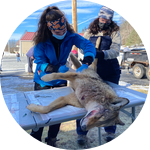About This Project
Echinococcus multilocularis is a tapeworm that infects wild canids, such as dogs, foxes, and coyotes. This tapeworm can be passed from infected canids to humans and cause a fatal disease, echinococcosis. When the European variant of this parasite was introduced to North America, we saw a rise of human infections in Canada and the U.S. We want to investigate where the parasite is present in New York and understand how it moves in the ecosystem in efforts to prevent human infection.
Ask the Scientists
Join The DiscussionWhat is the context of this research?
Historically, there has been little surveillance for Echinococcus species infections in wild hosts in North America. The introduction of the more infective European variant of E. multilocularis in North America has resulted in a drastic change in the parasite's epidemiology, range, and transmission patterns. The spread of the parasite and increase in prevalence in common hosts like coyotes and foxes present novel opportunities for the parasite to spillover into humans and domestic animals, specifically in urban areas. Surveillance for E. multilocularis in wild hosts is essential for understanding methods to prevent zoonotic spillover and the factors driving these dangerous epidemiological shifts.
What is the significance of this project?
Echinococcosis is beginning to be classified as an emerging zoonotic disease in areas of North America that are have initiated surveillance studies for the parasite in wildlife, domestic animals, and humans. New York State is a newly colonized region in the parasite's range expansion. Lack of public and practitioner knowledge of E. multilocularis limits our ability to track the spread of the parasite and efficiently disseminate public health safety information to at-risk groups. By identifying the distribution of the parasite and the factors that may be driving transmission through wildlife disease surveillance in New York canid (coyote and fox) populations, we can better prevent spillover to domestic animals and humans.
What are the goals of the project?
Our goals extend into researching the ecology and epidemiology of E. mulitlocularis in a novel area (New York State), and efficiently communicating public health information and safety measures to minimize the risk of zoonotic spillover in the northeast. We have been opportunistically sampling wild canids (coyotes and foxes) from across the state for Echinococcus infections. Genetically characterizing the isolated parasites will be done to evaluate the genetic factors that could be driving the spread of the parasite. Our plan is to develop a diagnostic test that can easily differentiate the European and North American variants of the parasite as to alleviate the practical pressures that inhibit routine sampling for this neglected parasite.
Budget
Funding for molecular testing (Genetic Sequencing and DNA Extraction Kits) will be used to screen domestic dogs for parasitic infection. Echinococcus multilocularis infections in domestic dogs pose a greater risk for humans because the parasite can spillover from dogs to humans more readily than from wildlife. We have been collecting fecal samples from local animal clinics in order to test domestic animals for this parasite. Identifying cases of domestic animal infection can only be done through genetic testing, which pet owners typically won't chose to do. Because this parasite can cause severe disease in humans, we need to be proactive about identifying cases of infection to protect the pet owners and veterinarians from contracting the parasite. Funding will also go toward the development and dissemination of educational materials on the parasite's biology and safety measures to high-risk groups such as hunters, trappers, and veterinarians.
Endorsed by
 Project Timeline
Project Timeline
This project relies heavily on the samples we collect from hunters, trappers, wildlife health labs, and the DEC. We plan to test wild canids for infection until October 2023, the end of the project. Genetic analysis on isolated parasites occurs on a rolling basis, as our samples come in and are tested for infection. Testing domestic dog fecal samples for Echinococcus infection is part of our goals for spillover prevention and will be taking place from May 2023 - October 2023.
Oct 24, 2022
Initial detection of E. multilocularis in New York submitted for publication
May 02, 2023
Speak at the Northeast Fish and Wildlife Agency annual meeting to raise awareness for E. multilocularis
Jul 06, 2023
Project Launched
Aug 01, 2023
Meet with infectious disease clinicians in the northeast to discuss reporting Echinococcus infections in humans
Nov 03, 2023
Map of E. multilocularis distribution in New York disseminated to hunting and trapping groups, government agencies, and veterinary clinics
Meet the Team
Corinne Conlon
I am a Masters student at SUNY College of Environmental Science and Forestry (SUNY-ESF) in the Fish and Wildlife Disease Lab under Dr. Christopher Whipps. My Masters research is on Echinococcus parasites in wild canid population in New York State. I am collaborating with Dr. Krysten Schuler from the Cornell Wildlife Health Lab on this project.
My interests center around controlling zoonotic parasites and pathogens that threaten the health of humans, wildlife, and domestic animal populations. Climate changes are directly affecting the re-emergence and spread of parasitic diseases in new regions, creating new public health emergencies that will affect the health, well-being, and stability of communities. I’m interested in the intersection between epidemiology within wildlife and human systems, and the different methods of control that can protect both populations from the consequences of parasitic diseases.
A great parasitology class and early experiences in necropsies and wildlife health in my undergraduate studies at SUNY-ESF motivated me to pursue research in wildlife disease. I've been completely hooked ever since. I enjoy investigating the complex systems that underlie any zoonotic pathogen and how host-pathogen interactions have evolved and continue to change under the anthropogenic pressures of globalization and climate change. My research with Echinococcus has also fueled my interest in pathogen genomics and phylogenetics.
Lab Notes
Nothing posted yet.
Project Backers
- 3Backers
- 7%Funded
- $80Total Donations
- $26.67Average Donation

